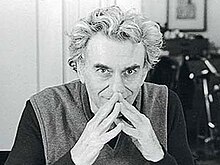Hyman Minsky | |
|---|---|
 | |
| Born | Hyman Philip Minsky September 23, 1919 |
| Died | October 24, 1996 (aged 77) |
| Nationality | American |
| Academic career | |
| Field | Macroeconomics |
| School or tradition | Post-Keynesian economics |
| Alma mater | University of Chicago (B.S.) Harvard University (M.P.A./Ph.D.) |
| Doctoral advisor | Joseph Schumpeter Wassily Leontief |
| Doctoral students | Mauro Gallegati L. Randall Wray |
| Influences | Henry Simons Karl Marx Joseph Schumpeter Wassily Leontief Michał Kalecki John Maynard Keynes Irving Fisher Abba Lerner |
| Contributions | Financial instability hypothesis Minsky moment |
| Information at IDEAS / RePEc | |
| Part of a series on |
| Macroeconomics |
|---|
 |
Hyman Philip Minsky (September 23, 1919 – October 24, 1996) was an American economist, a professor of economics at Washington University in St. Louis, and a distinguished scholar at the Levy Economics Institute of Bard College. His research attempted to provide an understanding and explanation of the characteristics of financial crises, which he attributed to swings in a potentially fragile financial system. Minsky is sometimes described as a post-Keynesian economist because, in the Keynesian tradition, he supported some government intervention in financial markets, opposed some of the financial deregulation of the 1980s, stressed the importance of the Federal Reserve as a lender of last resort and argued against the over-accumulation of private debt in the financial markets.[1]
Minsky's economic theories were largely ignored for decades, until the subprime mortgage crisis of 2008 caused a renewed interest in them.[2]
- ^ Uchitelle, Louis (October 26, 1996). "H. P. Minsky, 77, Economist Who Decoded Lending Trends". New York Times.
- ^ Keen, Steve (29 December 2010). "A monetary Minsky model of the Great Moderation and the Great Recession" (PDF). Journal of Economic Behavior & Organization. 86: 221–235. doi:10.1016/j.jebo.2011.01.010 – via Elsevier.